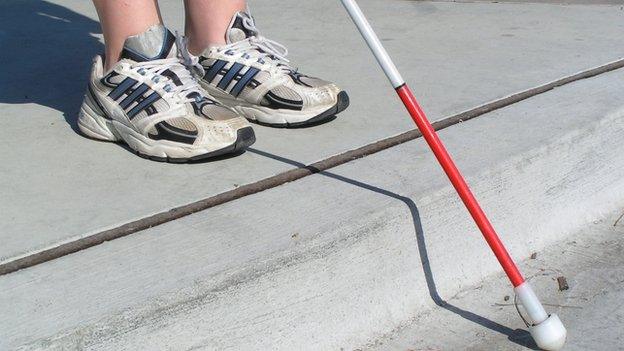RNIB Scotland warning over 'street obstacles'
- Published

There are about 180,000 blind and partially sighted people in Scotland
A charity has called for pavements to be kept clear to prevent blind and partially sighted people injuring themselves.
RNIB Scotland said a third of respondents to its survey had been injured by "street furniture".
Advertising boards, bollards, bins, cars parked on pavements and "shared space" schemes were the most common obstacles.
The charity said some respondents said they were too frightened to go outside.
It has launched a new Street Charter campaign which aims to highlight the problem and encourage councils to review their policies on the most common obstacles.
John Legg, director of RNIB Scotland, said: "We know it's impossible for streets to always be free of clutter. But we can do more to make them accessible.
"We hope our Street Charter campaign will help decision-makers understand what it's like for blind and partially sighted people trying to navigate the street environment."
RNIB Scotland called on local authorities to review their policies in relation to the most common obstacles, and engage with blind and partially sighted residents to put accessibility at the heart of local planning.
One suggestion is to invite councillors and officials to try walking a short distance while blindfolded, accompanied by a local resident with sight loss.
RNIB Scotland also wants the Scottish government to strengthen and reinforce existing legislation.
It said that, under the 1984 Roads Scotland Act, it is an offence to wilfully obstruct free passage along the road and deposit anything which causes an obstruction.
'Particularly hazardous'
The Equality Act 2010 requires public authorities to take reasonable steps to enable disabled people to avoid substantial disadvantages caused by physical features.
RNIB Scotland chairwoman Sandra Wilson, who is blind, lives in Fife.
She said: "Personally, I have frequent encounters with advertising boards, bins and badly parked cars - and recently almost broke a couple of teeth on what appeared to be a jutting-out railing.
"Paradoxically, pedestrian precincts are particularly hazardous as the absence of vehicles seems to attract even more street furniture."
More than 180,000 people in Scotland live with a significant level of sight loss, the charity said.